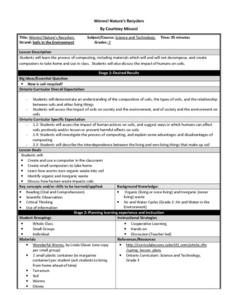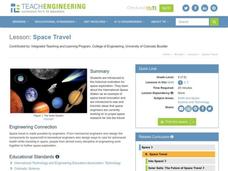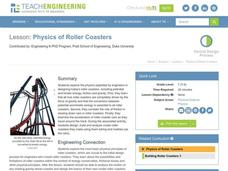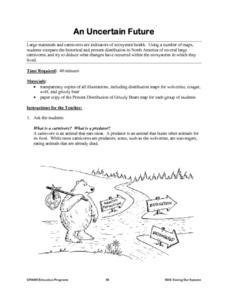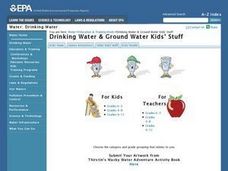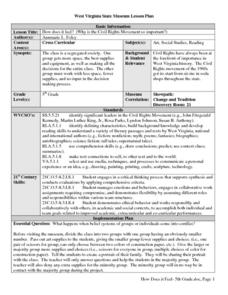Curated OER
Worms, Nature's Recyclers!
Learners study what worms need to survive in different environments. They study how worm composting improves soil and reduce waste. They discuss composting techniques and present a puppet show about a worm's life.
Curated OER
Your Body's Defenses When Microbes Attack
Pupils study how being exposed to a harmful microbe doesn't automatically make them ill. They discover the lines of defense against microbe invaders and explore the roles of skin and mucus membranes, white blood cells, and lymphocytes in...
Curated OER
What Should I Know about Respiration
How are kids supposed to know what to study for that cellular respiration test? With a study guide or reading guide like the one found here. With three pages of questions important to the understanding of respiration and the processes...
Curated OER
Antibiotic Resistance
Students using the scientific method, study bacteria as a covering surface of the earth in many forms. They discover that not all bacteria is bad and introduce the topic of antibiotic resistance. Science Fair expectations are addressed.
Curated OER
Space Travel
Students study the International Space Station and space exploration. In this space travel lesson plan students describe the different types of engineers that contribute to space travel.
Curated OER
The Beagle Brigade
Middle schoolers develop an understanding of animal behaviors through reading a case study about detector beagles. They explore the interaction of innate abilities and learned behaviors.
Curated OER
What Lives in Water?
In this early childhood science worksheet set, young scholars study the importance of water, and determine the difference between themselves and water dwellers. They look at adaptations, river life, rainforest life, food chains,...
Curated OER
Physics of Roller Coasters
Young scholars study the physics used to design today's roller coasters. In this engineering lesson students complete several activities including designing their own roller coaster.
Curated OER
Gravity
A summary of the science between gravity. Your students will find the resources links useful and the definition summaries relevant. This slideshow could be used to accompany a lecture or even for independent study.
Curated OER
What Should You Know about Classification?
Many learners have a tough time picking out pertinent information from a text or in class. Sometimes, all it takes is a study/reading guide to show them the way. The instructional activity here focuses on taxonomy and classification,...
Curated OER
Building Vocabulary with Model Airplanes
Your class can build new vocabulary while they study aircraft terminology. In order to work around pilot when they are on the flight line, learners build a model airplane applying the new vocabulary as they go. This hands-on real life...
Curated OER
An Uncertain Future
High schoolers study the distribution of large mammals and carnivores in an ecosystem. Using maps and historical data, they examine areas for these animals such as refuges, untouched forests, prairies and grasslands. Students determine...
Curated OER
Youth Activity: How People Get Their Water Reservoirs: "Holding Tanks" for Drinking Water
Students experience and participate in "Riding the Water Cycle" with this lesson. They explore, analyze and study the role of reservoirs in maintaining a reliable supply of drinking water. Each student constructs a model of a reservoir.
Curated OER
Writing Chemical Formulas
Learners study how to write chemical fomulas by reviewing the combinations atoms form into compounds. They write a procedure to test various substances and name the compounds and write formulas. As they construct models for formulas and...
Curated OER
What Should I know for the Test?
A three-page quiz about genetics, which includes Punnett squares, blood types, questions about Mendel and his contributions, and vocabulary comprehension. Use this for a study guide, a pretest/post-test, or a note-taking learning...
Curated OER
Finding Science in An American Childhood by Annie Dillard
High schoolers read excerpts from Annie Dillard's memoir, "An American Childhood," with the teacher. They experience opportunities to connect English, science, nature and art together from a new and unique perspective. This approach...
Curated OER
Honesty and Ethics in the Science Lab
Students complete a variety of lab and discussion activities as they are introduced to ethics and honest lab practices. They perform various biology, chemistry, or physics labs which test their ethical lab practices.
Curated OER
Why Does Evolution Matter Now?
Learners are shown why they should care about evolution. They become specialists in one sphere influenced by evolution and then share their findings with their group. Students are lead into a class discussion, so that each student can...
Curated OER
Who am I and Why?
Students make comparisons about themselves and others, which are real and meaningful. They study some basic concepts in the area of genetics and do a complimentary series of experiments, or explorations that illustrate these concepts
Curated OER
How does it feel? Why is the Civil Rights Movement so Important?
Fifth graders study the Civil War. In this US history activity, 5th graders simulate what life was like during the Civil War by having two groups with one group given more materials than the other group. Students then draw a...
Curated OER
Physical Science: Bridge Building
Students study bridges and design and build their own. They explore different types of bridges and build a basic beam bridge in pairs. After creating their beam bridge, they design a truss bridge and then build a suspension bridge and...
Curated OER
Become Math and Science Tutors
Students demonstrate how to be an effective math or science tutor. In this character education lesson plan, students discuss various resources and worksheets they can use for tutoring sessions. Students are then paired up with a younger...
Curated OER
Why Are Volcanoes Dangerous?
Students investigate the causes and characteristics of volcanic eruptions including pyroclastic eruptions. They study the effects of natural disasters.
Curated OER
The Solar System: Why do we Explore?
Third graders act as scientists. In this property discovery lesson, 3rd graders explore the substance "Oobleck" (cornstarch, water, food coloring). They work in groups to investigate the substance and make observations as a scientist...
